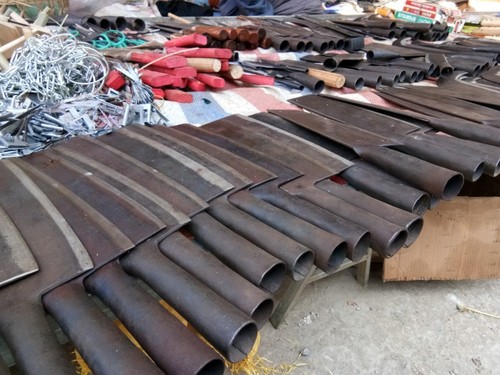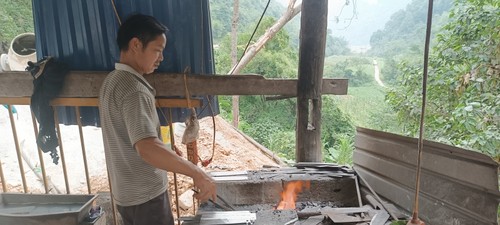 Phuc Sen blacksmith products (photo: VOV) Phuc Sen blacksmith products (photo: VOV) |
The oldest people in Phuc Sen village are not sure who the ancestors of the craft were or when the craft began. They all learned blacksmithing from their grandfathers and fathers when they were little. A folk story says that a male fairy who felt pity for the poor Nung An people taught them to forge tools, grow crops, and hunt.
Relics in the village indicate that Phuc Sen village was once a weaponry workshop of the Mac dynasty when it left the capital Thang Long in 1593 for Cao Bang to establish a base to fight the Le dynasty (1428-1789). The Mac dynasty was in Cao Bang from 1593 to 1677.
In Phuc Sen village, coal forges are heating constantly and incandescent sparks are seen everywhere. Phuc Sen’s farm tools, knives, and scissors are popular not only in the northern mountainous area but also in many distant localities. Nong Thi Nga is buying a pair of knives at Na Giang market: “I buy 2 knives every year. Phuc Sen’s knives are sharp and nice. These knives can be used to chop firewood and cut grass on the fields. These are good knives”
Almost every household in Phuc Sen has a forge and forging experience. Blacksmiths in Phuc Sen use salvaged leaf spring steel to make knives and farm tools. Experienced blacksmiths look at the color of heated steel to decide when to quench it in water to make it harder.
 All Phuc Sen blacksmith products are made by hand. (photo: VOV) All Phuc Sen blacksmith products are made by hand. (photo: VOV) |
Blacksmith Luong Van Truong said: “I’ve been doing this for about 14 years. I make many types of blades for knives, sickles, saws, chisels, vegetable chopping machines, sharpening knives, etc. This is hard work. We select salvaged flat springs, heat the steel bar, and beat it into shape. A good blacksmith can make up to 4 blades a day. Our customers say that Phuc Sen knives are durable and sharp. There are many forging workshops nationwide, but they use different techniques.”
Phuc Sen village doesn’t have a temple dedicated to the Blacksmith ancestors. Blacksmiths worship their ancestors on the 15th day of the 7th lunar month and at the Lunar New Year. On the Lunar New Year, they put away their tools, clean the forge, then put a pomelo branch on the forge to chase away evil spirits. On the morning of the first day, the family prepares a meal to worship the blacksmith ancestors. The offerings include a chicken, a kg of pork, a pair of rice cakes, liquor, and incense sticks. The main blacksmith in the family will heat the forge and make some symbolic items with a wish that during the coming year the forge will always burn and make many good products.
On the full-moon day of the 7th lunar month, they worship the blacksmith ancestors after worshiping the family ancestors and land deities. Blacksmith Long Van Chien said: “Many young villagers follow the craft. In order to live as blacksmiths, they must love their work very much. They will inherit the traditional craft and promote it.”
Phuc Sen village welcomes tourists to observe their production. They serve visitors typical local dishes, such as steamed pork, roasted duck, and dried pork and beef and perform folk arts of the Nung such as Ha Leu, Luon, and Sli singing and dancing.